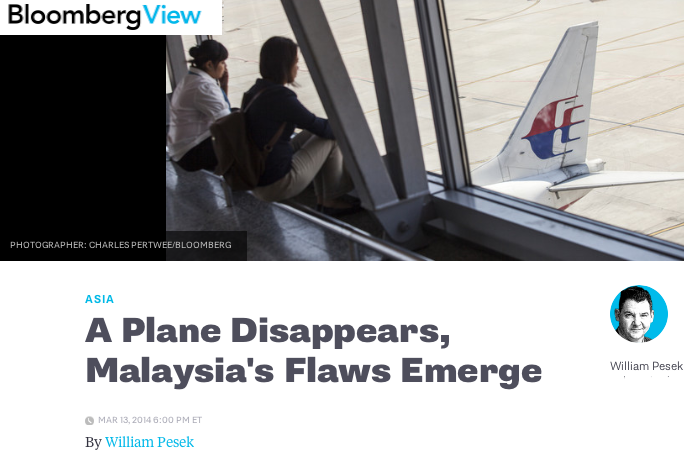Foreign Editors around the world have tended to shun the topic of Malaysia and its politics, judging it all as simply not lively enough to hold their readers.
It has allowed the country’s deep weaknesses, propped up by petrol and palm oil billions, to go unnoticed and for fatuous ad campaigns like “Malaysia Truly Asia’ to draw a veil over the selfishness of a greedy regime.
The dangerous persecution of opponents of BN in Malaysia has gone seriously under-reported as a result, as well as the theft of the public wealth and utter corruption of the ruling elite.
But, these issues are now receiving full scrutiny by reporters world-wide, still on standby to cover developments in the world’s greatest airline mystery. We reproduce another of these foreign insights by Bloomberg (below) and suggest that in future BN will have much more difficulty convincing others that it remains a legitimate regime for Malaysia.
A Plane Disappears, Malaysia’s Flaws Emerge
74
Confusion doesn’t normally make for a great economic indicator. But the chaos that’s marred the hunt for missing Malaysia Airlines Flight 370 is revealing quite a bit about Malaysia‘s potential — or lack thereof.
The Southeast Asian nation has long been hobbled by a political culture that places the ruling party’s needs over those of the Malaysian people. For six decades, Prime Minister Najib Razak’s United Malays National Organisation has appeared to have only one goal: to maintain its hold on power. It’s thus promoted — and recently reinforced — Malay-first racial policies that benefit its political base. The side effects, including stagnant living standards, waning competitiveness, and the humiliation of Malaysia’s sizable Chinese and Indian minority populations, are all overlooked in the service of this larger goal.
The bungled search for Flight 370 has simply made manifest the consequences of this cynical bargain. How does someone like Hishammuddin Hussein become defense minister and acting transport minister in Southeast Asia’s third-biggest economy? Even with his nearly 20-year stint as a legislator and more than a decade in ministerial posts, it can’t hurt that he’s also the scion of a powerful political family. The lamentable manner in which he has fielded questions about the search underscores how unaccustomed Malaysia’s leaders are to being questioned by anyone.
This mind-set also explains why Malaysia is ensnared in the middle-income trap that South Korea and Thailand escaped years ago. Rather than free the economy from race-based quotas and business preferences, the party has expanded them. Never mind that these policies make Malaysia even less attractive to multinational companies and encourage so many of the nation’s best and brightest to move to Singapore and Hong Kong. Or that the Philippines and Indonesia are surging ahead as Malaysia looks backward.
The country is proving to be all hardware and no software. For years, UMNO acted as though top-quality roads, state-of-the-art ports and bridges, iconic skyscrapers and a swanky new capital in Putrajaya would inevitably pave the way to prosperity. But economic software is even more important. And on that front, Malaysia has never bothered to cut red tape, level the playing field for non-Malays, or introduce the competitive forces necessary to stimulate entrepreneurship.
Why bother when all the party needs to do to stay in power is redraw voting districts, bribe the masses with fat handouts, invoke religion when necessary, and muzzle any pesky publications that dare to write about corruption and privilege? All this explains why per-capita income in a resource-rich nation with an enviable geographic position in Asia has stalled at near the $10,000 mark. Malaysia is stuck in the middle-income trap because its leaders are stuck in time.
The families of the victims of Flight 370 deserve better. But then, so do the Malaysians whom Najib claims to serve.
(William Pesek is a Bloomberg View columnist. Follow him on Twitter at @williampesek

